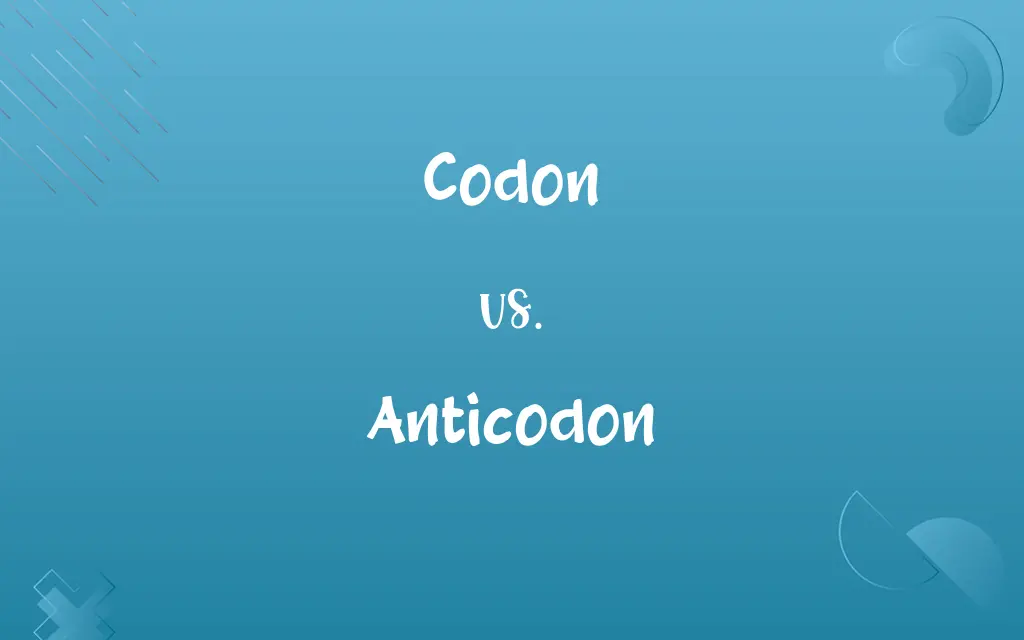Codon vs. Anticodon: Know the Difference

By Shumaila Saeed || Published on January 14, 2024
A codon is a sequence of three nucleotides in mRNA that specifies an amino acid or a stop signal during protein synthesis, while an anticodon is a complementary sequence in tRNA that pairs with a codon.

Key Differences
A codon is a fundamental unit in the genetic code, consisting of three consecutive nucleotides on mRNA. Each codon corresponds to a specific amino acid or a stop signal in protein synthesis. Anticodon, on the other hand, is a triplet sequence found on tRNA, crucial for translating mRNA in protein synthesis.
Shumaila Saeed
Jan 14, 2024
Codons are read during the process of translation in the ribosome, guiding the assembly of amino acids into proteins. In contrast, anticodons play a pivotal role in the recognition process, as each tRNA molecule with its specific anticodon pairs with the corresponding codon on the mRNA strand.
Shumaila Saeed
Jan 14, 2024
In the genetic code, there are 64 codons, each encoding for one of the 20 amino acids or a stop signal. Anticodons, however, do not directly encode anything but instead ensure the correct amino acid is added during protein synthesis by matching with codons.
Shumaila Saeed
Jan 14, 2024
The sequence of a codon determines the type of amino acid that will be added next in a growing protein chain. The anticodon, through complementary base pairing, ensures this accuracy by aligning the appropriate tRNA with the mRNA codon.
Shumaila Saeed
Jan 14, 2024
Codons are key in dictating the primary structure of proteins, influencing everything from structure to function. Anticodons, by facilitating the correct translation of this genetic information, ensure the proper functioning of proteins within cells.
Shumaila Saeed
Jan 14, 2024
ADVERTISEMENT
Comparison Chart
Function
Specifies amino acids or stop signals
Complementary to codon, ensures correct pairing
Shumaila Saeed
Jan 14, 2024
Role in Protein Synthesis
Dictates the sequence of amino acids
Brings the correct amino acid to the ribosome
Shumaila Saeed
Jan 14, 2024
Genetic Code Relation
Directly relates to genetic code
Complementary, but not directly coding
Shumaila Saeed
Jan 14, 2024
ADVERTISEMENT
Codon and Anticodon Definitions
Codon
Codons are found in messenger RNA.
MRNA codons are translated during protein synthesis.
Shumaila Saeed
Dec 18, 2023
Anticodon
Anticodons ensure correct protein synthesis.
The anticodon-codon pairing is crucial for accurate translation.
Shumaila Saeed
Dec 18, 2023
Codon
A codon is a sequence of three nucleotides in mRNA.
The codon AUG codes for the amino acid methionine.
Shumaila Saeed
Dec 18, 2023
Anticodon
An anticodon is part of the tRNA molecule.
Each tRNA anticodon brings a specific amino acid to the ribosome.
Shumaila Saeed
Dec 18, 2023
Codon
Codons are the language of the genetic code.
A series of codons in a gene determine the protein sequence.
Shumaila Saeed
Dec 18, 2023
ADVERTISEMENT
Anticodon
An anticodon is a sequence of three nucleotides in tRNA.
The anticodon pairs with its complementary codon in mRNA.
Shumaila Saeed
Dec 18, 2023
Codon
A codon is a unit of genetic code.
Each codon translates to a specific amino acid in a protein.
Shumaila Saeed
Dec 18, 2023
Anticodon
Anticodons are complementary to mRNA codons.
The anticodon UAC pairs with the codon AUG.
Shumaila Saeed
Dec 18, 2023
Codon
Codons are essential for protein synthesis.
The ribosome reads codons to assemble proteins.
Shumaila Saeed
Dec 18, 2023
Anticodon
Anticodons are key in translation.
Anticodons help decode the mRNA message into proteins.
Shumaila Saeed
Dec 18, 2023
Codon
A sequence of three adjacent nucleotides constituting the genetic code that determines the insertion of a specific amino acid in a polypeptide chain during protein synthesis or the signal to stop protein synthesis.
Shumaila Saeed
Dec 13, 2023
Anticodon
A sequence of three adjacent nucleotides in transfer RNA that binds to a corresponding codon in messenger RNA and designates a specific amino acid during protein synthesis.
Shumaila Saeed
Dec 13, 2023
Anticodon
(genetics) A sequence of three nucleotides in transfer RNA that binds to the complementary triplet (codon) in messenger RNA to specify an amino acid during protein synthesis.
Shumaila Saeed
Dec 13, 2023
Codon
(biochemistry) A sequence of three adjacent nucleotides, which encode for a specific amino acid during protein synthesis or translation.
Shumaila Saeed
Dec 13, 2023
Codon
A sequence of three nucleotides in a genome or a DNA or messenger RNA molecule, which specifies the incorporation of one amino acid or is a stop signal, during the biosynthesis of proteins. Codons occur within the protein-coding segments of the DNA or RNA genome of living organisms. The amino acid sequence of proteins synthesized on ribosomes is thus determined by the sequence of the nucleotides in the genome.
Shumaila Saeed
Dec 13, 2023
Codon
A specific sequence of three adjacent bases on a strand of DNA or RNA that provides genetic code information for a particular amino acid
Shumaila Saeed
Dec 13, 2023
Repeatedly Asked Queries
What is a codon?
A sequence of three nucleotides in mRNA that specifies an amino acid or a stop signal during protein synthesis.
Shumaila Saeed
Jan 14, 2024
What is an anticodon?
A complementary sequence of three nucleotides in tRNA that pairs with a codon.
Shumaila Saeed
Jan 14, 2024
Can a codon code for multiple amino acids?
Generally, one codon codes for one amino acid, but some amino acids are coded by multiple codons.
Shumaila Saeed
Jan 14, 2024
How do anticodons function in translation?
They pair with codons to bring the correct amino acid to the ribosome.
Shumaila Saeed
Jan 14, 2024
Can anticodons be mutated?
Yes, mutations in tRNA can affect anticodon sequences.
Shumaila Saeed
Jan 14, 2024
Do anticodons code for amino acids?
No, they pair with codons to ensure the correct amino acid is added.
Shumaila Saeed
Jan 14, 2024
Are anticodons universal?
Yes, they are a universal component of tRNA in all living organisms.
Shumaila Saeed
Jan 14, 2024
Do anticodons have a role in genetic regulation?
Indirectly, as they contribute to the accuracy of protein synthesis.
Shumaila Saeed
Jan 14, 2024
What is a stop codon?
A codon that signals the end of protein synthesis, like UAA, UAG, or UGA.
Shumaila Saeed
Jan 14, 2024
Do anticodons participate in gene expression?
Yes, by facilitating the translation of genes into proteins.
Shumaila Saeed
Jan 14, 2024
What happens if an anticodon mismatches a codon?
It can lead to the incorporation of the wrong amino acid, affecting protein function.
Shumaila Saeed
Jan 14, 2024
How specific is codon-anticodon pairing?
Highly specific, based on complementary base pairing rules.
Shumaila Saeed
Jan 14, 2024
What role do codons play in genetic diseases?
Mutations in codons can lead to incorrect amino acid sequences, causing diseases.
Shumaila Saeed
Jan 14, 2024
How are codons read during protein synthesis?
Sequentially, in a 5’ to 3’ direction on mRNA.
Shumaila Saeed
Jan 14, 2024
Can an anticodon pair with multiple codons?
Sometimes, due to wobble base pairing.
Shumaila Saeed
Jan 14, 2024
Do codons affect protein structure?
Yes, as they determine the amino acid sequence of proteins.
Shumaila Saeed
Jan 14, 2024
Share this page
Link for your blog / website
HTML
Link to share via messenger
About Author
Written by
Shumaila SaeedShumaila Saeed, an expert content creator with 6 years of experience, specializes in distilling complex topics into easily digestible comparisons, shining a light on the nuances that both inform and educate readers with clarity and accuracy.









































































